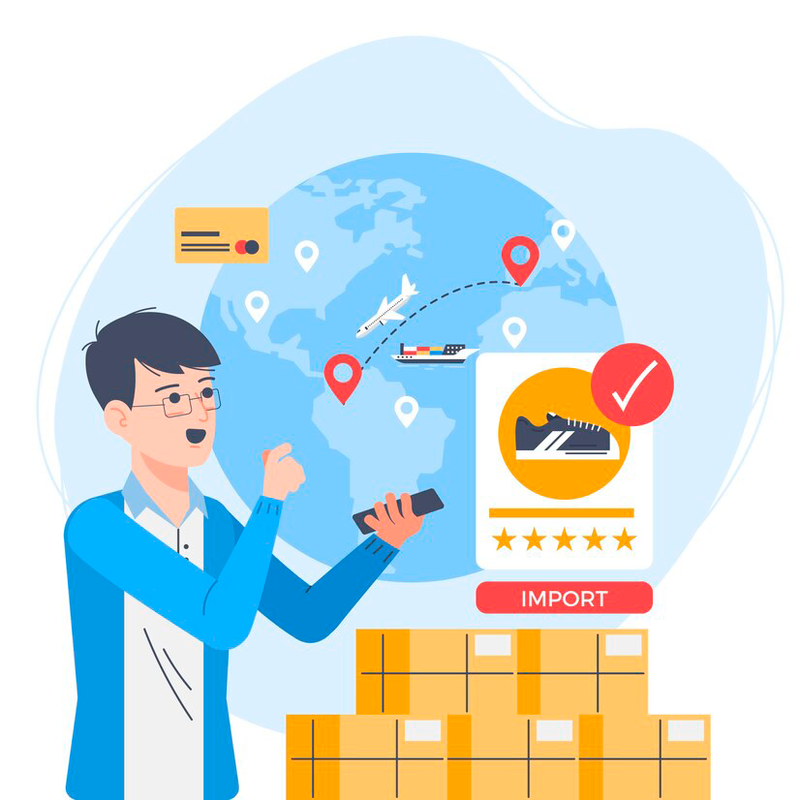Global Shipping: Customs Information
When dispatching a package outside the European Union, there are several key factors to consider. You’ll need to complete the required customs documentation, declare the value of each item, and specify the purpose of your shipment. Customs authorities will review your declarations and may impose import duties and taxes, which are typically the recipient's responsibility.
Sending gifts or personal belongings? These might be exempt from customs fees depending on the item’s value and the regulations of the destination country.
This guide covers everything you need to know about navigating customs procedures for international package deliveries.
Expert Tip
For smooth international shipping, always provide clear and accurate descriptions for each item in your package, along with their values. This helps expedite the customs clearance process and may help prevent delays. Additionally, understanding the customs regulations of the destination country can help you and the recipient avoid unexpected costs and ensure a smoother delivery experience.
Customs Clearance Procedure
Post n Packages makes international shipping easy by providing all the required customs documents when you ship outside the EU. Unlike a freight forwarder, our courier services include customs clearance as part of the delivery process.
Here’s what to expect during customs clearance:
- During booking, you will declare the contents and purpose of your shipment.
- We generate the necessary customs documentation for you to print.
- When your package arrives at the destination, our carrier handles customs clearance. The customs authorities will review your declaration and determine any import duties.
- The recipient will be contacted to pay any applicable duties and taxes, which may cause delays in delivery.
- If you prefer, you can prepay these charges, which is a popular option for gift shipments. This service requires an additional fee and deposit.
Once all charges are settled, your package will clear customs and continue to its final destination.


Understanding Customs Regulations
Customs regulations are mandatory, and all international courier services must comply with them. Customs authorities operate under the government of the destination country with two main objectives:
- Preventing the importation of illegal or restricted items.
- Assessing imported goods to determine any applicable import taxes and duties.
Import restrictions and charges vary by country, and it is the sender’s responsibility to be aware of these regulations before shipping. For example, some countries in South America prohibit the import of used clothing, even as personal belongings. To ensure your items are allowed, you can contact customs in the destination country or our customer service team for assistance.
Import Duties, Taxes, and Fees
Customs authorities assess import charges for your international shipment based on the customs forms you provide. This includes the declared value, reason for export, and description of goods.
Many countries have specific regulations, often setting a duty-free threshold for low-value items. Gifts, samples, and personal belongings may attract lower duties or be exempt from charges entirely. For specific thresholds and more details, please contact us.
Some individuals declare a lower value on the customs form to reduce duties and taxes. This is advisable only if the lower value can be legitimately justified under customs scrutiny. For example, a laptop purchased for £1000 might now be worth only £200 to you. Declaring it at £200 could reduce customs charges, but if customs questions the value, you must justify it. The shipment will be held until customs are satisfied with the explanation. Note that declaring a lower value may also affect your claim value in case of loss or damage.
Post n Packages has no control over customs charges. Once your parcel reaches customs in the destination country, you must pay any applicable fees before delivery can proceed.
If your items are subject to duties (e.g., if they are for sale), customs will determine the charges based on the declared value and the products shipped. Each product has a commodity code (also known as a Customs Tariff code or harmonization code), which dictates the duty and tax level, varying from country to country. Incorrect or missing commodity codes may lead customs to estimate the duty based on your item description, potentially resulting in higher charges for high-value items. To ensure accuracy and potentially lower duties, verify the correct commodity code for your goods.
To understand the exact customs duty and tax to be applied, contact the customs authority in the destination country with the correct commodity codes for your products.


Completing Customs Paperwork
When sending a package outside the EU, a customs declaration is required for all items except documents. It is important to remember that the information provided on the customs invoice is legally binding.
Overview of the Process:
Upon booking a delivery outside the EU, Post n Packages will request the following information:
- A detailed list of the items in your shipment.
- The value of each item.
- The purpose of the shipment—such as a gift, personal belongings, or a business sample.
Post n Packages will generate your customs invoice after you complete your online booking and when you print your shipping labels.
We recommend printing five copies of the customs invoice:
- Attach two copies to your package.
- Provide the remaining three copies to the courier during collection.
Detailed instructions will be provided at the time of booking to ensure compliance and ease of process.
Prepaying Customs Duties & Taxes
Post n Packages understands that you might prefer to cover the customs charges yourself, especially if you are sending a gift. We offer an option to pay these charges in advance.
If you wish to prepay the customs charges, please contact our customer service team immediately after completing your booking. This arrangement must be made before your package is collected.
Additional Charges for This Service:
- A deposit of 25% of the value of the goods being shipped. If the actual customs charges are lower, the balance will be refunded.
- A £25 administration fee.
Once payment is received, we will issue a new shipping label and customs invoice. When your package reaches customs, Post n Packages will handle the payment of any duties and taxes on your behalf and refund any overpayment from your deposit.


Monitoring Your Shipment through Customs
You can track your package from pickup to delivery directly on our website, with real-time updates on its location and status.
If your shipment experiences delays at customs, the tracking status will automatically update to ‘Exception’. This status indicates that your shipment is awaiting customs clearance and provides the reason for the delay.
For more detailed information about any clearance delays, feel free to contact our customer service team. Often, such delays occur because the recipient has not yet paid the required customs charges. To expedite the process, we recommend contacting the recipient to encourage prompt payment of these charges. Once customs has received payment, the shipment will be cleared for delivery.
Frequently Asked Questions
Many countries offer exemptions from import duties and taxes for gifts, personal belongings, and business samples up to a specific value threshold. These exemptions are not universal and vary by country.
To verify if your shipment qualifies for these exemptions and to confirm the exemption level for the country you are shipping to, please contact us.
Lowering the declared value of your shipment can reduce customs charges. However, it is crucial to provide an accurate valuation on your customs invoice. Inaccuracies can raise suspicions at customs, potentially delaying your delivery and leading to increased charges.
Always ensure that the values declared are truthful and justifiable to avoid complications during the customs clearance process. Accurate documentation helps ensure a smoother delivery process with fewer delays and additional costs.
If you believe customs has incorrectly assessed the duty and taxes on your shipment, it’s often due to the absence of a tariff code on the customs invoice. This omission can lead customs to independently categorize your goods, which might result in incorrect charges.
Both you and the recipient have the right to dispute these charges before the shipment is delivered. To initiate a dispute, you need to:
- Identify and document the correct customs tariff codes for each product you’re shipping.
- Provide evidence to customs demonstrating that the goods were cleared under an incorrect tariff code.
This process requires thorough research and precise documentation to successfully challenge and rectify the assessed duties and taxes.
If the recipient declines to pay the required customs charges, delivery of the goods cannot proceed. Post n Packages offers a couple of options in such situations:
- We can bill the charges back to the sender.
- We can arrange for the parcel to be returned to the sender.
If customs permits the return of the goods, the sender will be responsible for the return shipping costs.
If you have paid for guaranteed delivery but your parcel was delayed in customs, it’s important to understand our refund policy. While we strive to ensure timely delivery, our money-back guarantee does not cover delays caused by factors outside our control. Since customs clearance is governed by government regulations, it falls outside the scope of our direct influence and thus, related delivery delays are not eligible for refunds under our guarantee.
Customs delays can occur for several reasons, impacting the timely delivery of your shipment. Understanding these reasons can help you mitigate potential delays:
- Duty and Tax Notification: Customs confirms the duty and taxes applicable to your shipment and notifies the carrier. The carrier then contacts the recipient to arrange payment. Delays may occur if the recipient is unavailable or cannot be reached promptly. Recipients are advised to contact the carrier as soon as possible to arrange clearance.
- Query on Declarations: Customs may question the accuracy or completeness of the customs invoice declaration. This requires clarification, which can cause delays. Recipients should contact the carrier quickly to resolve any issues and facilitate clearance.
- Inspection and Valuation Issues: If customs inspects the parcel and finds items to be under-valued or undeclared, this significantly delays the process. Customs may request proof of value or further details about the items. Ensuring accurate and complete declarations is crucial to avoid such delays.
- Prohibited or Restricted Items: If a shipment contains prohibited or restricted items, customs may hold the parcel. Typically, you can choose to have the prohibited items removed and destroyed or have the entire shipment returned. Return shipping charges will apply if the latter option is chosen.
